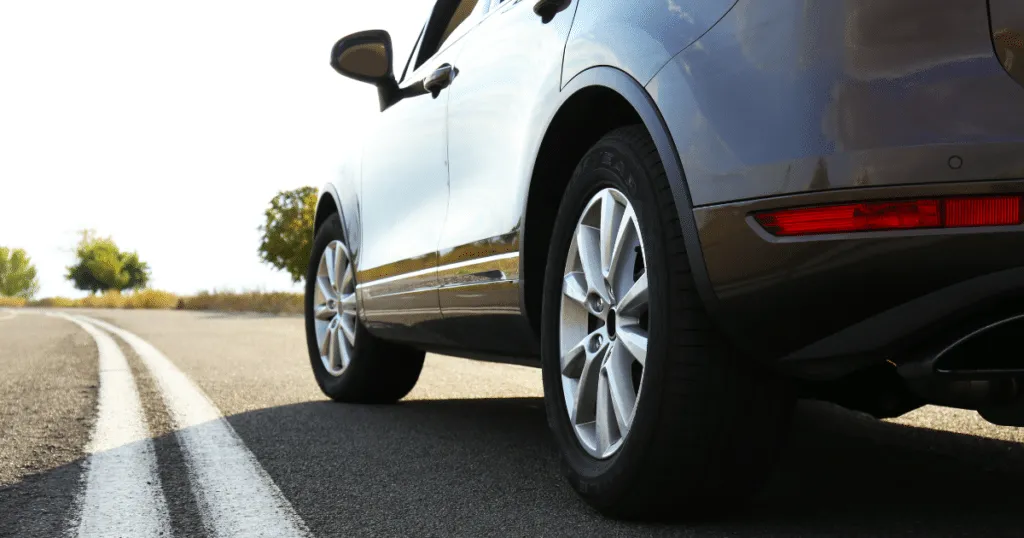You’re driving down a familiar Rhode Island road when a sudden jolt rattles your car. You’ve hit a pothole, and now you’re left with a flat tire or worse—serious damage to your vehicle. It’s a frustrating and often expensive situation, leaving many drivers asking: Who’s responsible for the costs of pothole damage?
Potholes are a common hazard, especially in Rhode Island’s unpredictable weather, where frequent storms and ever-changing weather wreak havoc on roads. From flat tires and bent rims to costly suspension repairs, the financial and safety implications of hitting a pothole can be significant. Understanding liability is crucial, as it determines whether you or another party, like a government entity or private property owner, is responsible for covering the damages.
Whether it’s navigating insurance claims, filing a report, or exploring legal options, knowing your rights can make all the difference in resolving pothole-related damage effectively. Here’s what every Rhode Island driver needs to know if their car gets damaged by a pothole.
Understanding Pothole Damage In Rhode Island
Potholes are more than just an inconvenience; they’re a costly hazard for drivers across Rhode Island. These road imperfections form when water seeps into cracks, freezes, and expands, causing the pavement to weaken and eventually break apart under the weight of traffic. In a region with harsh winters and frequent freeze-thaw cycles, potholes are a common and persistent problem.
The impact of hitting a pothole can range from minor inconveniences to significant vehicle damage. Flat tires and bent rims are among the most immediate and visible issues. However, the damage can go deeper, affecting your car’s suspension, alignment, and undercarriage. In severe cases, potholes may even lead to brake line damage or steering problems, posing a risk to your safety.
Recognizing pothole-related damage early is essential, especially for successful insurance claims and avoiding costly repairs. For instance, documenting visible damage and noting the exact location of the pothole can strengthen your case with an insurance provider. Moreover, addressing damage promptly can help prevent minor issues from escalating into costly repairs.
Potholes can cause a range of issues for your car. But who picks up the tab? Understanding your rights and responsibilities is the first step toward managing these unexpected costs.
Who Can Be Held Liable For Pothole Damage In Rhode Island?
When your car is damaged by a pothole, determining liability is key to recovering costs. In Rhode Island, understanding liability starts with identifying where the pothole was and whether reasonable action was taken to fix it before the damage occurred.
Public Entities And Municipalities
The Rhode Island Department of Transportation (RIDOT) and local city or county municipalities are tasked with maintaining public roads. If a pothole on a state or city road causes a car accident or damage to your car, these entities could be held liable. However, proving liability is challenging. You must show that the government knew—or should have known—about the pothole and failed to repair it in a reasonable time. Moreover, filing a claim with state or local authorities often involves strict deadlines and specific documentation, so acting quickly is crucial.
Private Property Owners
If the pothole is on private property, such as a shopping center parking lot, the property owner or management company may be liable. Owners are responsible for maintaining safe conditions on their premises, including repairing potholes. Documenting the location and damage is essential for pursuing a claim.
Third Parties
In rare cases, third parties, such as contractors, might share liability. For example, if roadwork was performed improperly and led to hazardous conditions, the contractor could be held accountable.
How Does Rhode Island’s Government Liability Work?
Recovering costs for pothole damage from public or government entities in the state of Rhode Island can be complicated due to the principle of “governmental immunity.” This legal concept limits the liability of state and local governments, protecting them from lawsuits in many circumstances. However, exceptions exist. If you can prove that a government entity knew about a dangerous pothole and failed to repair it within a reasonable time, you may have grounds for a pothole damage claim in Rhode Island.
Rhode Island state laws impose strict requirements for filing claims against the state or local municipalities. For example, the RIDOT mandates all claims must be submitted within 7 days of the incident for injuries or damage caused by potholes on state roads or highways. You must also submit all supporting information and documents within 60 days. Delays in filing can result in the denial of your claim, regardless of its merits.
Navigating the claims process involves submitting a written report detailing the incident, the pothole’s location, and evidence of the damage to your vehicle caused by the pothole. Photographs of the pothole and your vehicle, repair estimates, and proof of the pothole’s location can strengthen your case. Once submitted, you can expect a response within a few weeks, though approval rates are often low due to the challenges of proving government negligence.
Moreover, government entities often have a cap on pothole claim reimbursement. For example, in Rhode Island, RIDOT limits reimbursement for pothole-related claims on state roads to $300. This highlights the importance of understanding your legal rights and exploring additional options, such as insurance coverage or consulting an attorney, to cover the remaining costs.
Filing a claim with the state might seem like a long shot, but knowing your rights under Rhode Island law is crucial. By acting quickly and providing thorough documentation, you increase your chances of recovering damages.
Insurance And Pothole Damage: What You Need To Know
Dealing with insurance after hitting a pothole can be tricky, but understanding your policy is key to minimizing out-of-pocket expenses. Most standard car insurance policies do not automatically cover pothole damage unless you have specific coverage.
When choosing the additional coverage, you might get confused between choosing comprehensive vs. collision coverage. Comprehensive coverage generally does not include pothole-related damage, as it covers non-collision incidents like theft or natural disasters. On the other hand, collision coverage applies when your vehicle hits another vehicle or object, like a pothole, and is essential for covering repairs such as bent rims or suspension damage.
When filing an insurance claim, thorough documentation can make all the difference. Take clear photographs of the damage to your vehicle and the pothole itself, including its location and any surrounding road conditions. Keep copies of repair estimates, receipts, and a detailed account of the incident. This evidence strengthens your claim and helps avoid disputes with your insurance provider.
If your claim is denied, review the denial letter to understand the reasons. For example, the damage may fall outside your coverage, or the denial may state that there is insufficient evidence to prove liability. Consider appealing the decision by providing additional documentation or seeking a second opinion. If the denial persists, consider alternative options, such as filing a complaint with your state’s insurance regulator or consulting an attorney for legal advice.
Understanding your policy and acting promptly can help you avoid costly mistakes and recover from pothole damage with minimal hassle.
Can You Sue For Damage Caused By Potholes In Rhode Island?
Although it is possible to file a property damage claim against the government for a pothole accident in Rhode Island, the process is often complicated by the legal protections afforded to state and local governments. While these entities are generally shielded from lawsuits under governmental immunity laws, exceptions exist for situations where negligence can be proven. Specifically, you must demonstrate that the government entity responsible for maintaining the roadway knew about the hazardous pothole and failed to patch potholes within a reasonable timeframe, leading to your vehicle’s damage. For pothole-related damages caused by private property owners or third parties, the process may involve fewer legal hurdles, as these parties are typically held to stricter maintenance standards.
The process begins with collecting strong evidence to support your claim. Take detailed photographs of the pothole, your vehicle’s damage, and the surrounding area to establish the conditions at the time of the incident. Repair invoices, location details, and witness statements further strengthen your case. Additionally, maintaining detailed records of communication with the government entity or property owner can help show whether they were aware of the issue.
Legal guidance is crucial for determining whether your case has merit and navigating procedural requirements. An attorney experienced in Rhode Island liability laws can assist in filing notices of intent to sue, meeting deadlines, and building a compelling case. Pursuing a lawsuit may be worth considering if your damages are substantial and alternative recovery methods, like insurance claims, prove insufficient.
Preventative Measures: How To Avoid Vehicle Damage Caused By Pothole
While you can’t always avoid every pothole, staying alert and making a few simple changes can significantly reduce the risk of damage to your vehicle. By adopting some proactive measures, you can protect your car and avoid costly repairs.
Stay Vigilant On The Road
Keep your eyes on the road and scan for potholes, especially in areas prone to poor road conditions or after bad weather. Driving at a safe speed allows more reaction time to avoid potholes without sudden, dangerous maneuvers.
Maintain Proper Tire Pressure And Alignment
Underinflated or overinflated tires are more susceptible to damage from potholes. Regularly check and maintain your tire pressure according to manufacturer recommendations. Similarly, ensure your vehicle’s alignment is in good condition, as misaligned wheels are more vulnerable to suspension damage and uneven wear when hitting a pothole.
Avoid Potholes When Possible
If you spot a pothole, try to safely steer around it. If unavoidable, slow down before reaching it and avoid braking directly over the pothole to minimize the impact.
Check Road Conditions And Report Potholes
Familiarize yourself with roads in a state of disrepair and plan alternate routes when possible. If you encounter a large or hazardous pothole, report it to local authorities or state agencies like the RIDOT. Timely reporting helps improve road safety and reduces risks for all drivers.
Why Consult With A Rhode Island Car Accident Lawyer
If your car has been damaged by a pothole, consulting a Rhode Island car accident lawyer can make a significant difference in recovering your losses. While some cases may seem straightforward, the complexities of insurance claims, government liability, and potential lawsuits often require professional guidance.
An experienced car accident attorney can assist in navigating the claims process, whether it involves filing a report with your insurance company, submitting a claim to the RIDOT, or pursuing legal action against a responsible party. They can ensure your claim is complete, properly documented, and submitted within strict deadlines, increasing your chances of success.
For cases involving governmental entities, where strict requirements and caps on reimbursement exist, an attorney can evaluate the viability of your claim and advocate for fair compensation. They can also provide support if your insurance company denies your claim or offers inadequate coverage for the damage.
Working with a lawyer who understands Rhode Island’s laws and road maintenance regulations ensures you have an advocate who can handle the complexities of your case. This allows you to focus on getting your vehicle repaired without the stress of navigating legal hurdles.
Don’t let pothole damage turn into a bigger financial burden. An experienced attorney can guide you through the process, protect your rights, and help you pursue the compensation you deserve.
Contact Marasco & Nesselbush Law Firm For Legal Help To File A Pothole Damage Claim
Potholes can be a costly and frustrating issue, but understanding liability is the first step toward recovering your expenses. Whether your case involves government entities, private property owners, or insurance disputes, the right legal guidance can make all the difference.
At Marasco & Nesselbush, our Rhode Island personal injury lawyers are here to help you navigate the complexities of pothole damage claims. From evaluating your case to handling insurance claims and legal filings, we’ll guide you every step of the way.
Potholes can be a major inconvenience, but you don’t have to face the aftermath alone. Contact us today for a free initial consultation, explore your options for compensation, and let us help you navigate the complex legal process to pursue fair compensation.
FAQs
How do I file a claim for an accident caused by a pothole in Rhode Island?
To file a claim, document the damage with photos and repair estimates. Submit a written report to the RIDOT or the relevant municipality within 7 days. Provide detailed evidence, including the pothole’s location, the incident timeline, and details of property damage, to strengthen your claim.
Can I sue the state for pothole damage?
Yes, but only if you can prove the state or municipality knew about the pothole and failed to repair it within a reasonable time. Governmental immunity laws make these cases challenging, so consulting an experienced attorney is crucial for success.
Will my car insurance cover pothole damage in Rhode Island?
Collision coverage typically covers pothole damage, while comprehensive policies generally do not. Check your insurance policy details and document the incident thoroughly when filing a claim.
How long do I have to report pothole damage in Rhode Island?
You must report pothole damage to RIDOT or the responsible municipality within 7 days of the incident. Failing to meet this deadline may result in a claim denial, regardless of the case’s merit.
What should I do if my car is damaged by a pothole but I don’t have collision coverage in Rhode Island?
Without collision coverage, you may need to file a claim with the state or property owner. Document the incident thoroughly and consider seeking legal advice if reimbursement options are limited.
Can I file a lawsuit against my vehicle’s manufacturer or parts maker in Rhode Island?
You can sue a manufacturer if defective parts contributed to the damage, but you must prove negligence or fault. Consult an attorney to evaluate your case and determine if pursuing legal action is viable.
Do you have a case?
If you think you may have a case,
contact us now for a FREE consultation
"(Required)" indicates required fields


